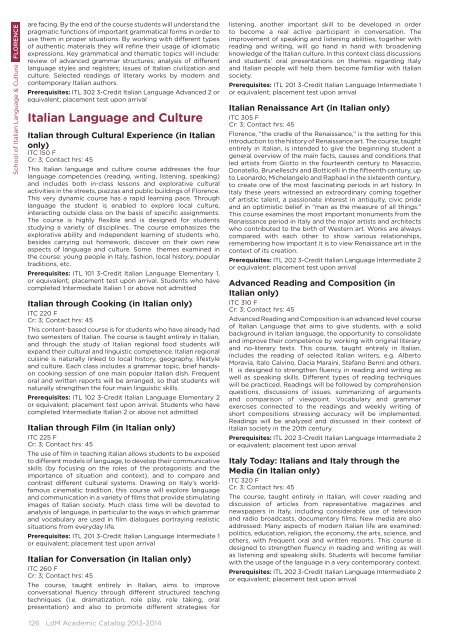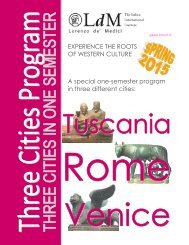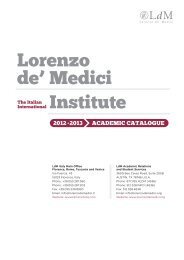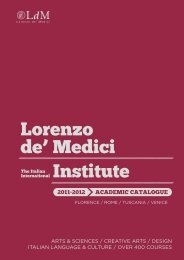aCademiC Catalog 2013-2014 - Lorenzo de Medici
aCademiC Catalog 2013-2014 - Lorenzo de Medici
aCademiC Catalog 2013-2014 - Lorenzo de Medici
You also want an ePaper? Increase the reach of your titles
YUMPU automatically turns print PDFs into web optimized ePapers that Google loves.
School of Italian Language & Culture FLORENCE<br />
are facing. By the end of the course stu<strong>de</strong>nts will un<strong>de</strong>rstand the<br />
pragmatic functions of important grammatical forms in or<strong>de</strong>r to<br />
use them in proper situations. By working with different types<br />
of authentic materials they will refine their usage of idiomatic<br />
expressions. Key grammatical and thematic topics will inclu<strong>de</strong>:<br />
review of advanced grammar structures; analysis of different<br />
language styles and registers; issues of Italian civilization and<br />
culture. Selected readings of literary works by mo<strong>de</strong>rn and<br />
contemporary Italian authors.<br />
Prerequisites: ITL 302 3-Credit Italian Language Advanced 2 or<br />
equivalent; placement test upon arrival<br />
Italian Language and Culture<br />
Italian through Cultural Experience (in Italian<br />
only)<br />
ITC 150 F<br />
Cr: 3; Contact hrs: 45<br />
This Italian language and culture course addresses the four<br />
language competencies (reading, writing, listening, speaking)<br />
and inclu<strong>de</strong>s both in-class lessons and explorative cultural<br />
activities in the streets, piazzas and public buildings of Florence.<br />
This very dynamic course has a rapid learning pace. Through<br />
language the stu<strong>de</strong>nt is enabled to explore local culture,<br />
interacting outsi<strong>de</strong> class on the basis of specific assignments.<br />
The course is highly flexible and is <strong>de</strong>signed for stu<strong>de</strong>nts<br />
studying a variety of disciplines. The course emphasizes the<br />
explorative ability and in<strong>de</strong>pen<strong>de</strong>nt learning of stu<strong>de</strong>nts who,<br />
besi<strong>de</strong>s carrying out homework, discover on their own new<br />
aspects of language and culture. Some themes examined in<br />
the course: young people in Italy, fashion, local history, popular<br />
traditions, etc.<br />
Prerequisites: ITL 101 3-Credit Italian Language Elementary 1,<br />
or equivalent; placement test upon arrival. Stu<strong>de</strong>nts who have<br />
completed Intermediate Italian 1 or above not admitted<br />
Italian through Cooking (in Italian only)<br />
ITC 220 F<br />
Cr: 3; Contact hrs: 45<br />
This content-based course is for stu<strong>de</strong>nts who have already had<br />
two semesters of Italian. The course is taught entirely in Italian,<br />
and through the study of Italian regional food stu<strong>de</strong>nts will<br />
expand their cultural and linguistic competence. Italian regional<br />
cuisine is naturally linked to local history, geography, lifestyle<br />
and culture. Each class inclu<strong>de</strong>s a grammar topic, brief handson<br />
cooking session of one main popular Italian dish. Frequent<br />
oral and written reports will be arranged, so that stu<strong>de</strong>nts will<br />
naturally strengthen the four main linguistic skills.<br />
Prerequisites: ITL 102 3-Credit Italian Language Elementary 2<br />
or equivalent; placement test upon arrival. Stu<strong>de</strong>nts who have<br />
completed Intermediate Italian 2 or above not admitted<br />
Italian through Film (in Italian only)<br />
ITC 225 F<br />
Cr: 3; Contact hrs: 45<br />
The use of film in teaching Italian allows stu<strong>de</strong>nts to be exposed<br />
to different mo<strong>de</strong>ls of language, to <strong>de</strong>velop their communicative<br />
skills (by focusing on the roles of the protagonists and the<br />
importance of situation and context), and to compare and<br />
contrast different cultural systems. Drawing on Italy’s worldfamous<br />
cinematic tradition, this course will explore language<br />
and communication in a variety of films that provi<strong>de</strong> stimulating<br />
images of Italian society. Much class time will be <strong>de</strong>voted to<br />
analysis of language, in particular to the ways in which grammar<br />
and vocabulary are used in film dialogues portraying realistic<br />
situations from everyday life.<br />
Prerequisites: ITL 201 3-Credit Italian Language Intermediate 1<br />
or equivalent; placement test upon arrival<br />
Italian for Conversation (in Italian only)<br />
ITC 260 F<br />
Cr: 3; Contact hrs: 45<br />
The course, taught entirely in Italian, aims to improve<br />
conversational fluency through different structured teaching<br />
techniques (i.e. dramatization, role play, role taking, oral<br />
presentation) and also to promote different strategies for<br />
listening, another important skill to be <strong>de</strong>veloped in or<strong>de</strong>r<br />
to become a real active participant in conversation. The<br />
improvement of speaking and listening abilities, together with<br />
reading and writing, will go hand in hand with broa<strong>de</strong>ning<br />
knowledge of the Italian culture. In this context class discussions<br />
and stu<strong>de</strong>nts’ oral presentations on themes regarding Italy<br />
and Italian people will help them become familiar with Italian<br />
society.<br />
Prerequisites: ITL 201 3-Credit Italian Language Intermediate 1<br />
or equivalent; placement test upon arrival<br />
Italian Renaissance Art (in Italian only)<br />
ITC 305 F<br />
Cr: 3; Contact hrs: 45<br />
Florence, “the cradle of the Renaissance,” is the setting for this<br />
introduction to the history of Renaissance art. The course, taught<br />
entirely in Italian, is inten<strong>de</strong>d to give the beginning stu<strong>de</strong>nt a<br />
general overview of the main facts, causes and conditions that<br />
led artists from Giotto in the fourteenth century to Masaccio,<br />
Donatello, Brunelleschi and Botticelli in the fifteenth century, up<br />
to Leonardo, Michelangelo and Raphael in the sixteenth century,<br />
to create one of the most fascinating periods in art history. In<br />
Italy these years witnessed an extraordinary coming together<br />
of artistic talent, a passionate interest in antiquity, civic pri<strong>de</strong><br />
and an optimistic belief in “man as the measure of all things.”<br />
This course examines the most important monuments from the<br />
Renaissance period in Italy and the major artists and architects<br />
who contributed to the birth of Western art. Works are always<br />
compared with each other to show various relationships,<br />
remembering how important it is to view Renaissance art in the<br />
context of its creation.<br />
Prerequisites: ITL 202 3-Credit Italian Language Intermediate 2<br />
or equivalent; placement test upon arrival<br />
Advanced Reading and Composition (in<br />
Italian only)<br />
ITC 310 F<br />
Cr: 3; Contact hrs: 45<br />
Advanced Reading and Composition is an advanced level course<br />
of Italian Language that aims to give stu<strong>de</strong>nts, with a solid<br />
background in Italian language, the opportunity to consolidate<br />
and improve their competence by working with original literary<br />
and no-literary texts. This course, taught entirely in Italian,<br />
inclu<strong>de</strong>s the reading of selected Italian writers, e.g. Alberto<br />
Moravia, Italo Calvino, Dacia Maraini, Stefano Benni and others.<br />
It is <strong>de</strong>signed to strengthen fluency in reading and writing as<br />
well as speaking skills. Different types of reading techniques<br />
will be practiced. Readings will be followed by comprehension<br />
questions, discussions of issues, summarizing of arguments<br />
and comparison of viewpoint. Vocabulary and grammar<br />
exercises connected to the readings and weekly writing of<br />
short compositions stressing accuracy will be implemented.<br />
Readings will be analyzed and discussed in their context of<br />
Italian society in the 20th century.<br />
Prerequisites: ITL 202 3-Credit Italian Language Intermediate 2<br />
or equivalent; placement test upon arrival<br />
Italy Today: Italians and Italy through the<br />
Media (in Italian only)<br />
ITC 320 F<br />
Cr: 3; Contact hrs: 45<br />
The course, taught entirely in Italian, will cover reading and<br />
discussion of articles from representative magazines and<br />
newspapers in Italy, including consi<strong>de</strong>rable use of television<br />
and radio broadcasts, documentary films. New media are also<br />
addressed. Many aspects of mo<strong>de</strong>rn Italian life are examined:<br />
politics, education, religion, the economy, the arts, science, and<br />
others, with frequent oral and written reports. This course is<br />
<strong>de</strong>signed to strengthen fluency in reading and writing as well<br />
as listening and speaking skills. Stu<strong>de</strong>nts will become familiar<br />
with the usage of the language in a very contemporary context.<br />
Prerequisites: ITL 202 3-Credit Italian Language Intermediate 2<br />
or equivalent; placement test upon arrival<br />
126<br />
LdM Aca<strong>de</strong>mic <strong>Catalog</strong> <strong>2013</strong>-<strong>2014</strong>





